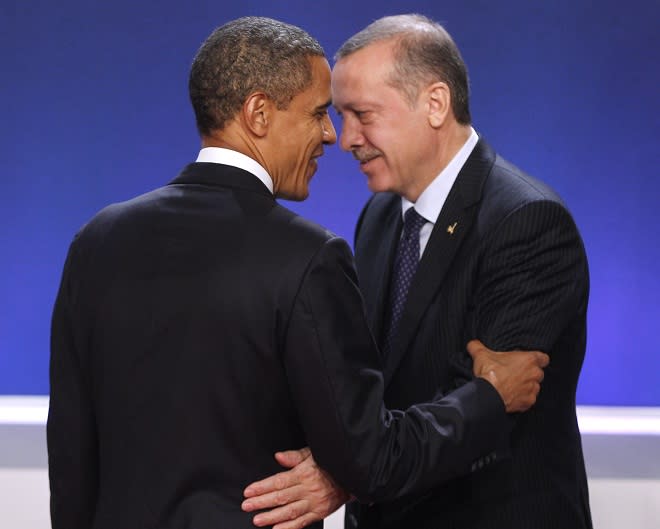 The Envoy
The EnvoyQ&A with Turkish envoy: The decision that inspired Obama’s trust in Erdogan

President Obama recently named Turkey's Prime Minister Recep Tayyip Erdogan as one of five world leaders with whom he enjoys the most effective working relations.
"I think that if you ask them—[German Chancellor] Angela Merkel or [Indian] Prime Minister Manmohan Singh or [South Korean] President Lee [Myung-bak] or [Turkish] Prime Minister Erdogan or [British Prime Minister] David Cameron would say, we have a lot of trust and confidence in the President," Obama told Time magazine's Fareed Zakaria in an interview this month. "That's part of the reason we've been able to forge these close working relationships and gotten a whole bunch of stuff done."
For Turkey's Ambassador to the United States Namik Tan, the reason for Obama's expressed confidence in Erdogan is clear: trust. The Turkish leader has proved to Obama he is true to his word.
Case in point: this past September, Turkey's Erdogan agreed to host a powerful U.S. radar as part of a NATO missile defense shield monitoring Iran's missile activity. The decision advanced a key NATO alliance security objective, but was not without potential risk for Ankara.
Tan spoke to Yahoo News in an interview Friday. More of our conversation below.
Yahoo News: What do you think are the reasons Obama named Prime Minister Erdogan one of the leaders with whom he enjoys the best working relations in the world?
Ambassador Tan: President Obama appreciates Prime Minister Erdogan because he is frank and true to his word.
Apart from the NATO radar system that you just mentioned, Turkey has also played an exceptionally positive role in the Arab spring, in keeping it on track. The situation needed someone coming from the Islamic tradition, with a free market economy and democracy, with western institutions. No other country could play that role.
There is increasingly strong cooperation between the two ally nations and the mutual trust developed during the handling of many important developments taking place around the world. A similar relationship exists between Secretary [of State Hillary] Clinton and Foreign Minister [Ahmet] Davutoglu who meet or talk almost every week.
Events over the past year have made Turkey an indispensable ally for the US.
Yahoo News: The United States and Turkey have come to close alignment over the past year on policies towards the uprisings in Syria, Libya, as well as on Iran…
Tan: On Iran, we are very concerned about the recent escalation of tensions and the potential for a major conflagration. We want to calm down tensions.
Yahoo News: Turkish Foreign Minister Davutoglu was in Iran earlier this month, shortly thereafter he received a visit from U.S. Deputy Secretary of State Bill Burns, and then from Iranian Parliament Speaker Ali Larijani and Iranian foreign minister Ali Akbar Salehi.
Tan: Turkey has told Iran that there is a serious and negative debate about its role in the region—in Iraq, Syria, and the Strait of Hormuz.The sectarian tensions in Syria and Iraq are very difficult, very fragile, and could easily get out of control.
Yahoo News: Iran's foreign minister has publicly said Iran would accept a new round of international nuclear talks to be held in Turkey.
Tan: Iran did not accept Turkish criticism of its behavior in Syria and Iraq. But Iran said it would accept a return to talks with the P5+1. …[United States, UK, France, Germany, China, Russia over its nuclear program].
Our offer was not that the talks should happen in Turkey. If it's better, we would be happy to host, though.
After Davutoglu's meetings with the Iranians, he briefed [European Union High Representative Catherine] Ashton on the discussions—[and Iran's ascent to talks].
She said ok, but we will need a letter from them, which Turkey has asked Iran to send.
Yahoo News: Turkey and Iraq have been experiencing a notable rise in tensions since the withdrawal of the last U.S. forces from Iraq in December.
Ambassador Tan: The stability of the Middle East is closely linked with the developments in Iraq. In the wake of the withdrawal of the U.S. troops, Iraq is now truly sovereign and it has a unique chance to set an example of democratic governance for the rest of the region. We believe that only with an inclusive and representative government can Iraq overcome the challenges it faces. Disenfranchising certain segments of the society and creating new grievances among the various political parties will undermine the relevant stability in the country. Turkey's aim is to engage with all the components of the Iraqi people to help them address some of the democratic challenges they are confronted with. Bolstering the democratic environment in Iraq and giving a fair and equal share to all the various political parties regardless of their ethic or sectarian backgrounds in the government, will help Turkey and the U.S. further enhance their economic, cultural and social partnership with Iraq.
Yahoo News: We know Obama likes Prime Minister Erdogan. Does Erdogan admire Obama?
Tan: I believe, he likes President Obama. And as far as I know, he appreciates him—his genuineness.
Other popular Yahoo! News stories:
• Hillary Clinton says she's done with "high wire" of American politics
• Transportation Secretary Ray LaHood's son among U.S. NGO officials barred from leaving Egypt
• UN envoy Susan Rice shores up interest group support, in move seen advancing Secretary State bid
• White House taps NSC aides for senior Pentagon posts
Want more of our best national security stories? Visit The Envoy or connect with us on Facebook and on Twitter.
Want more of our best political stories? Visit The Ticket or connect with us on Facebook, follow us on Twitter, or add us on Tumblr.

